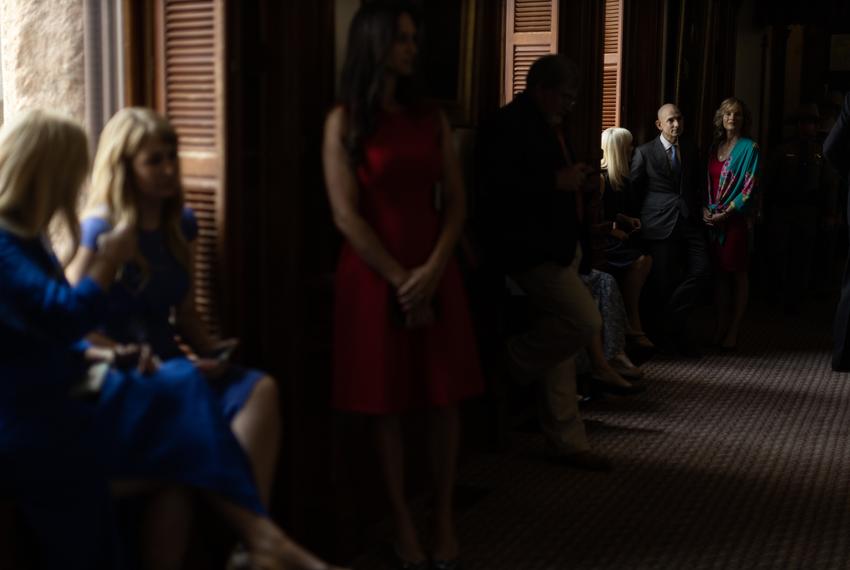Texas runoff yields no clear winner among GOP’s warring factions, setting stage for power struggle

Sign up for the We the Texans newsletter to receive twice-monthly updates on our year-long initiative dedicated to boosting civic engagement and chronicling how democracy is experienced in Texas.
On the morning of Tuesday’s runoff, new Texas GOP Chair Abraham George called for an end to the Republican civil war.
“Let’s all come together and row in the same direction,” he said, urging the warring factions of the party to “focus on defeating Democrats” once the primaries were over.
For George and his far-right allies, the call was contingent on GOP House Speaker Dade Phelan losing his runoff that evening, allowing Republicans to coalesce behind an even more conservative leader who would run the chamber by rejecting bipartisan compromise. Instead, Phelan eked out a win in his Southeast Texas district and vowed to keep control of the gavel next year — and the facade of unity dissolved.
Attorney General Ken Paxton, Phelan’s No. 1 enemy, quickly sent up a warning shot to Republicans in the House who might dare to support the speaker.
“My message to Austin is clear: to those considering supporting Dade Phelan as Speaker in 2025, ask your 15 colleagues who lost reelection how they feel about their decision now,” Paxton said in a statement. “You will not return if you vote for Dade Phelan again."
Phelan, R-Beaumont, has been a lightning rod for the GOP’s ultraconservative wing since he backed Paxton’s impeachment on corruption and bribery charges last spring. The hard right, led by Paxton and Lt. Gov. Dan Patrick, accused Phelan of ceding too much power to Democrats and went all out trying to oust him and his allies in the primary.
In the end, neither of the dueling GOP factions landed a clean knockout blow — instead they both emerged from the rubble of the vicious primary season injured and emboldened, their grudges calcified. The party’s far-right flank drove a record 15 House GOP incumbents from office, replacing most of them with new Phelan-hating recruits eager to upend the status quo and focus on social issues. At the same time, the hard right fell short of its biggest prize, allowing Phelan to scrape by. And while the anti-Phelan contingent expanded its numbers more than ever before, in doing so it may have entrenched the speaker’s support among GOP members who bristled at the attacks on the entire House’s conservative bona fides.
It was a cutthroat primary season even by Texas’ standards, defined by relentless attacks on candidates’ integrity and distortions of their voting records, all amplified by historic levels of campaign ad spending. And it only seemed to lay the groundwork for more GOP chaos and strife, with no clear end in sight. Phelan’s House allies remained defiant in support of the embattled speaker, while his rivals cast the results in other runoffs — six of Phelan’s allies lost their seats — as a referendum for change.
“Like Republican voters in my own district in March, the voters here in [Phelan’s] district saw through the lies and deception and learned what we all know to be true — the past two sessions, under his leadership, have been the most conservative sessions in the history of Texas,” Rep. Jeff Leach, R-Plano, said in a statement Tuesday evening.
Leach was one of 11 GOP incumbents who were at Phelan’s side celebrating his win in Beaumont, a group that also included state Rep. Jared Patterson. The Frisco Republican told Lubbock radio host Chad Hasty on Wednesday that Phelan was “the most conservative speaker in the history of Texas” and predicted a majority of House Republicans would back him when their caucus meets in December to pick the speaker candidate they will nominate on the floor the following month, when the Legislature reconvenes.
Phelan’s staunchest House critics dug in their heels, too, pointing to the mass turnover beyond the speaker’s runoff. Patrick, who presides over the Senate, pinned the incumbent losses on Phelan, arguing he “threw them under the bus” by failing to lead on passing school vouchers and by allegedly compelling members to impeach Paxton — the two major flashpoints in the primaries.
“There are some Republicans out there, quite frankly, this morning who are choking on their own Kool-Aid,” Patrick told Dallas radio host Mark Davis, referring to Phelan’s House allies. “To say that, ‘Oh we love Dade, he’s great, he’s wonderful, we’re going to bring him back.’ I'm sorry, then you're part of that team who wants to allow Democrats to control the [House] in a crimson red Republican state.”
The anti-Phelan bloc has organized behind a list of demands for the next speaker, dubbed the “Contract with Texas,” that would kneecap Phelan’s power, should he win, and further diminish the influence of Democrats in the chamber. Phelan has taken flak from critics who say he should have done more to stop Democrats from using parliamentary maneuvers to kill or delay GOP bills last year. He has also faced blowback for continuing a longstanding tradition of appointing Democrats to chair eight of the House’s 34 standing committees.
Twenty-one Republican nominees have signed onto the “contract,” forming about one-fourth of the House GOP Caucus if they all win in November.
The organizers of the “contract” released an unsigned statement Wednesday arguing that runoff voters “loudly reaffirmed the message they sent on March 5th,” invoking the GOP incumbents ousted in the first round of the primaries.
“Yesterday’s election results herald the arrival of eight new reinforcements to our cause,” the statement read, referring to the six incumbent challengers and two other signatories who won open primaries. “The days of dysfunctional governance are numbered, as we vow to end the era of excuse-making and blame-shifting.”
State Rep. Nate Schatzline, R-Fort Worth, wrote on social media that the runoffs were a “HUGE WIN for the grassroots,” adding that next year’s session “is about to be WILD!” One of only three members to vote against Phelan last year, Schatzline affirmed he would do so again when lawmakers reconvene in January.
State Rep. Tom Oliverson — once a Phelan ally — said Wednesday that Phelan’s primary win was not changing his resolve to challenge him as House leader. The Cypress Republican pledged to “take the fight all the way to the floor” — rather than backing out at the last moment if he didn’t have the votes — so that GOP members would get the chance to “declare their preference … for the status-quo or a new direction.”
Oliverson was joined in the speaker's race Thursday by state Rep. Shelby Slawson, R-Stephenville, who offered a scathing assessment of Phelan's leadership style as she announced her bid in a letter to fellow House Republicans.
“Our reform-minded members outnumber the status-quo supporters, and our ranks have grown with new energy this election cycle,” Slawson wrote. “We are collectively up to the task of decentralizing the power structure in the House and wholly changing the culture that throttles us instead of empowers us.”
Patrick, who lives next door to Oliverson and shares a political consultant with him, has declined to weigh in on Oliverson’s candidacy. He told Davis he does not think Phelan will win back the gavel — but vowed that if he does, “we will be on his butt” about giving Democrats any political power.
“Everyone's going to be watching him like a hawk,” Patrick said.
To be elected speaker, a House member must secure 76 votes, a majority of the 150-seat chamber. Democrats control 64 seats, meaning a speaker hopeful could theoretically win with full Democratic support and around a dozen of the 86 Republicans. To prevent this scenario, Phelan’s rivals have called for speaker candidates to only solicit support from Republican members.
Leach said the House GOP Caucus’ bylaws require a candidate to secure 60% of the group’s support at its December closed-door meeting to pick a speaker nominee ahead of session — meaning Phelan would need the support of 52 Republicans under the House’s current makeup.
Hurt feelings
As the primaries receded, some of Phelan’s allies urged Republicans to set aside the acrimony so they could focus on Democrats in November.
“There are hurt feelings after every single primary, more so this time because of the lies and the vitriol [directed at] all kinds of candidates for office — more than I’ve seen in 15 years in politics,” Patterson said. “But we have got to come together.”
State Rep. Gary VanDeaver, the only anti-voucher Republican who won his runoff, acknowledged the primaries “damaged relationships” between House GOP lawmakers. But while “there's no doubt [the House] is a different environment from the one we left,” VanDeaver said, he argued that most members probably share his desire to move on from the campaign and be “the adults in the room.”
VanDeaver, a Phelan ally who chairs the House committee in charge of education funding, said he “absolutely” supports Phelan and intends to vote for him next year. The New Boston Republican is one of the survivor’s of Gov. Greg Abbott’s separate but parallel war against House incumbents who voted against school vouchers.
Abbott endorsed VanDeaver the last couple election cycles, then spent more than $670,000 this year trying to deny him another term as part of the anti-voucher purge.
The feuding turned nasty: Abbott accused VanDeaver of voting against legislation to protect his own financial interests, a charge he denied. The governor also called VanDeaver a “fraud” for running a TV ad that claimed Abbott’s voucher bill would have given tax dollars to illegal immigrants, an argument Abbott’s strategist dismissed as “nonsense.”
VanDeaver said he is “ready to move forward.”
“I have experienced personal attacks, attacks on my character,” VanDeaver said. “That's one thing about a race like this. You learn who your friends are, but more importantly, you learn who they're not.”
Leach said he was also ready to turn the page, telling Davis, the Dallas radio host, that his “fellow Republicans, whether I supported them in the primary or not, are not my enemy. … My enemy is radical progressive Democrats who are working very hard, very aggressively, to take over the Texas House.”
After backing state Reps. Frederick Frazier, R-McKinney, and Justin Holland, R-Rockwall, in their runoffs, Leach sought to extend an olive branch to the two challengers who ousted them — both of whom oppose Phelan’s speakership.
"Keresa Richardson, Katrina Pierson are going to be wonderful members of the Texas House, I have no doubt about it,” Leach told Davis.
Left unmentioned was a third runoff winner, veteran and GOP activist David Lowe, who unseated state Rep. Stephanie Klick, R-Fort Worth. Leach seemed especially eager to see Klick win, labeling Lowe a “porn industry profiteer” and “sexual degenerate” on social media last week. (Lowe, accused of owning pornographic web domains, has said he once bought and resold web domains in bulk to make money.) Lowe, for his part, has suggested Leach is a closet Democrat and accused him of “leaching off the Republican Party and concurrently turning his back on it.”
The two are poised to become House colleagues in January.
Voting FAQ: 2024 Elections
-
What other elections should I know about?
-
Are there rules at the polls?
-
What are my rights as a voter?
-
What if I was planning to vote in person, but I have been diagnosed with COVID-19 or get sick?
-
What can I do if I have trouble voting?
- Read more
We’ve added new speakers to the stellar lineup of leaders, lawmakers and newsmakers hitting the stage at The Texas Tribune Festival, happening Sept. 5–7 in downtown Austin. Get an up-close look at today’s biggest issues at Texas’ breakout politics and policy event!
Information about the authors
Learn about The Texas Tribune’s policies, including our partnership with The Trust Project to increase transparency in news.

